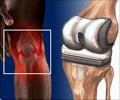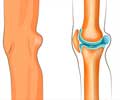According to a new study total knee replacement (TKR) successfully relieves pain and improves function in patients with advanced knee arthritis.
Total knee replacement (TKR) successfully relieves pain and improves function in patients with advanced knee arthritis, according to a study presented today at the 2010 Annual Meeting of the American Academy of Orthopaedic Surgeons (AAOS). The //surgery also significantly improves dynamic balance among elderly patients. Impaired balance and increased tendency to fall are common complaints among the elderly suffering from severe osteoarthritis (worn cartilage). The purpose of the study was to determine whether TKR had any effects on balance measures, in correlation with functional balance and quality of life. This is especially important because falls are the leading cause of injury for senior adults in the U.S., and hip fractures that result from falls can be lethal for elderly patients."Balance is critical to the elderly, especially those with knee problems. This study reinforced our hypothesis about how an osteoarthritic patient's function is compromised not only due to pain, but also by balance," said Leonid Kandel, MD, study author and orthopaedic surgeon, Department of Orthopaedic Surgery, Hadassah Mount Scopus Hospital, Jerusalem, Israel. The study examined 63 patients, with a mean age of 73, who had total knee replacements and participated in follow-up evaluations after one year. The study measured accurately static and dynamic balance with a new computerized system called the Balance Master. The study found:
- Significant improvement in dynamic balance one year after surgery;
- Significant progress in balance-determined motor tests; and
- Strong statistical correlation between the balance and the Oxford Knee Score functional questionnaire and the quality of life questionnaire SF-36.
Source-Eurekalert
THK









